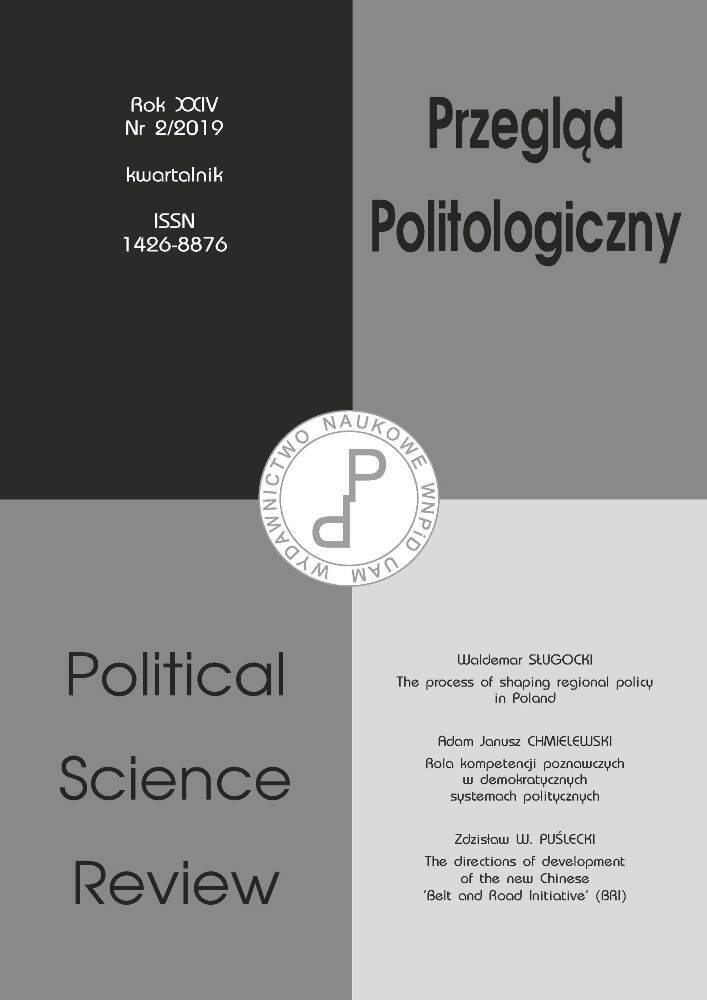Abstrakt
Artykuł omawia stosunki między Europą i krajami Bliskiego Wschodu oraz konsekwencje tych relacji w ciągu ostatnich dwóch dekad, poprzez analizę „arabskiej wiosny”. Określenie „arabska wiosna” odnosi się do serii wydarzeń obejmujących demonstracje, przemoc i wojnę domową, które przetoczyły się przez kraje arabskie od końca 2010 r. Wywołane przez siły oporu wobec autorytarnych reżimów doprowadziły do upadku przywódców Egiptu, Tunezji i Libii. Protesty zwolenników demokracji, zrównoważonej gospodarki i likwidacji korupcji rządowej udało się jednak wykorzystać do swoich celów islamistom. Wprawdzie nie było wówczas jasne, jakie nowe reżimy przejmą władzę, ale powszechnie oczekiwano, że będą to siły islamistyczne. W kategoriach deklaracji, polityki i zaangażowania fizycznego Europa zareagowała na wydarzenia arabskiej wiosny pozytywnie w obawie, że wyniki protestów mogą zostać wykorzystane przez siły islamistyczne, mimo że przez dziesięciolecia państwa Zachodu łączyła z wieloma obalonymi tyranami współpraca i przyjazne stosunki. Polityka przymykania oka na brak demokracji i łamanie praw człowieka w tych krajach była jednak często postrzegana jako sprzeczna z wartościami europejskimi. W dniu 25 maja 2011 r. Unia Europejska opublikowała dokument przyznający, że nie udało jej się przeprowadzić reform politycznych w sąsiednich krajach arabskich. Po wydarzeniach arabskiej wiosny konieczne było wypracowanie nowego podejścia do wzmocnienia partnerstwa między Europą a światem arabskim. Cele europejskiej polityki wobec świata muzułmańskiego obejmują powstrzymanie masowej migracji muzułmańskiej, zmniejszenie wpływu fundamentalistycznego i radykalnego islamu na Bliskim Wschodzie, a także wśród muzułmanów w Europie, oraz zapewnienie dostaw surowców energetycznych z tych krajów. Sprostanie tym wyzwaniom będzie znaczącym krokiem we właściwym kierunku.
Bibliografia
Amidror Y. (2015), Chaos because of the Storm, Begin Sadaat Center for Strategic Researches (Hebrew).
Barcelona Declaration and Euro-Mediterranean Partnership, EU, Europa, November 22, 2011, http://europa.eu/legislation_summaries/external_relations/relations_with_third_countr ies/mediterranean_partner_countries/r15001_en.htm.
Bendata B. (2012), The Arab Upheaval and Lebanon: Is Everything Quiet on the Levant Front?, in: One Year to the Arab Spring: Regional and International Implications (pp. 55–57), eds. Y. Guzinsky, M. Heller, The Institute for Researches of National Security, Tel Aviv University, Memorandum 114, March (Hebrew).
Brum S. (2012), Regional Implications of the Arab Spring, in: One Year to the Arab Spring: Regional and International Implications (pp. 39–41), eds. Y. Guzinsky, M. Heller, The Institute for Researches of National Security, Tel Aviv University, Memorandum 114, March (Hebrew).
Eran O. (2011), The West and the Arab Spring, The Institute for National Security Researches, Tel Aviv University, Strategic Update, July, 14 (2), 15–26 (Hebrew).
Guzinsky Y., Heller M. (2012), Introduction, in: One Year to the Arab Spring: Regional and International Implications (pp. 7–8), Y. Guzinsky, M. Heller, The Institute for Researches of National Security, Tel Aviv University, Memorandum 114, March (Hebrew).
Hashemi N. (2009), Islam, Secularism and Liberal Democracy: Toward a Democratic Theory for Muslim Societies, Oxford University Press, New York.
Heisbourg F. (2003), New Security Landscape: The End of the Post-Cold War Era, “Asia-Pacific Reaccessed,” 10(1), pp. 52–63.
Herm A. (2008), Recent Migration Trends: Citizens of EU-27 Member States Become Ever More Mobile while EU Remains Attractive to Non-EU citizens, Eurostat, 98/2008, http://epp.eurostat.ec.europa.eu/cache/ITY_OFFPUB/KS-SF-08098/EN/KS-SF-08-098-EN.PDF.
Hollis R. (1997), Europe and the Middle East: Power by Stealth?, “International Affairs”, 73(1), pp. 15–29.
Horowitz N. (2013), The ‘Islamic Spring’ – Revolution of Transition Season, in: Molad – Center for Renewal of Democracy, http://www.molad.org.article (Hebrew).
International Money Fund (2011), Report to the G-8 Summit: Economic Transformation in MENA: Delivering on the Promise Shared Prosperity, http://www.imf.org/external/np/g8/pdf/052711.pdf.
Kam E., Bendata B., Dekel U., Heller M., Shwitzer Y. (2015), Shocks in the Middle East, in: Strategic Assessment for Israel, 2014–2015, Institute for National Security Researches, Tel Aviv University, pp. 77–97 (Hebrew).
Kemp G. (2003), Europe’s Middle East Challenges, “The Washington Quarterly”, 27(1), pp. 163–177.
Kenig O. (2013), The Arab Spring and Democracy: A Look at Two Comparative Measures, The Israeli Institute for Democracy, June, https://www.idi.org.il/articles/9678 (Hebrew).
Livman T. (2013), Explanations of the European Policy towards the “Arab Spring”: Calculated Risk from Lack of Choice and the Implications for Israel, in: Politics – Israeli Journal for Political Science and International Relations, The Leonard Davis Institute for International Relations, The Hebrew University in Jerusalem, 22, pp. 79–106 (Hebrew).
Meoz M. (2013), Political Islam and the Arab Spring, in: Israel and the Arab Spring: Opportunity for Change (pp. 34–41), eds. N. Goren, J. Yodkovitz, Outlines of the Israeli Institute for Extra-Regional Policy (Hebrew).
Podeh E. (2013), The Arab Spring as a Historical Opportunity, in: Israel and the Arab Spring, an Opportunity for Change (pp. 5–6), eds. N. Goren, G. Yudkovitz, Mediators. The Israeli Institute for Extra-Reigonal Policy and the Friedrich Ebert Fund (Hebrew).
Sasar A. (2012), Tradition and Modernity in the “Arab Spring”, Institute for National Security Researches, Tel Aviv University, Strategic Update, April, 1154 (1), pp. 27–37 (Hebrew).
Stein S. (2012), The European Union and the Arab Spring, in: One Year to the Arab Spring: Regional and International Implications (pp. 25–27), Y. Guzinsky, M. Heller, The Institute for Researches of National Security, Tel Aviv University, Memorandum 114, March (Hebrew).
Volpi F. (2008), Introduction: Strategies for Regional Cooperation in Mediterranean: Rethinking the Parameters of the Debate, in: Transnational Islam and Regional Security –Cooperation and Diversity between Europe and North Africa, ed. F. Volpi, Routledge, New York, pp. xii–xvi.
Yadlin A. (2012), A Year to the Arab Uprising, in: One Year to the Arab Spring: Regional and International Implications (pp. 11–17), eds. Y. Guzinsky, M. Heller, The Institute for Research of National Security, Tel Aviv University, Memorandum 114, March (Hebrew).
Youngs R. (2006), Europe and the Middle East in the Shadow of September 11, Boulder, London.

